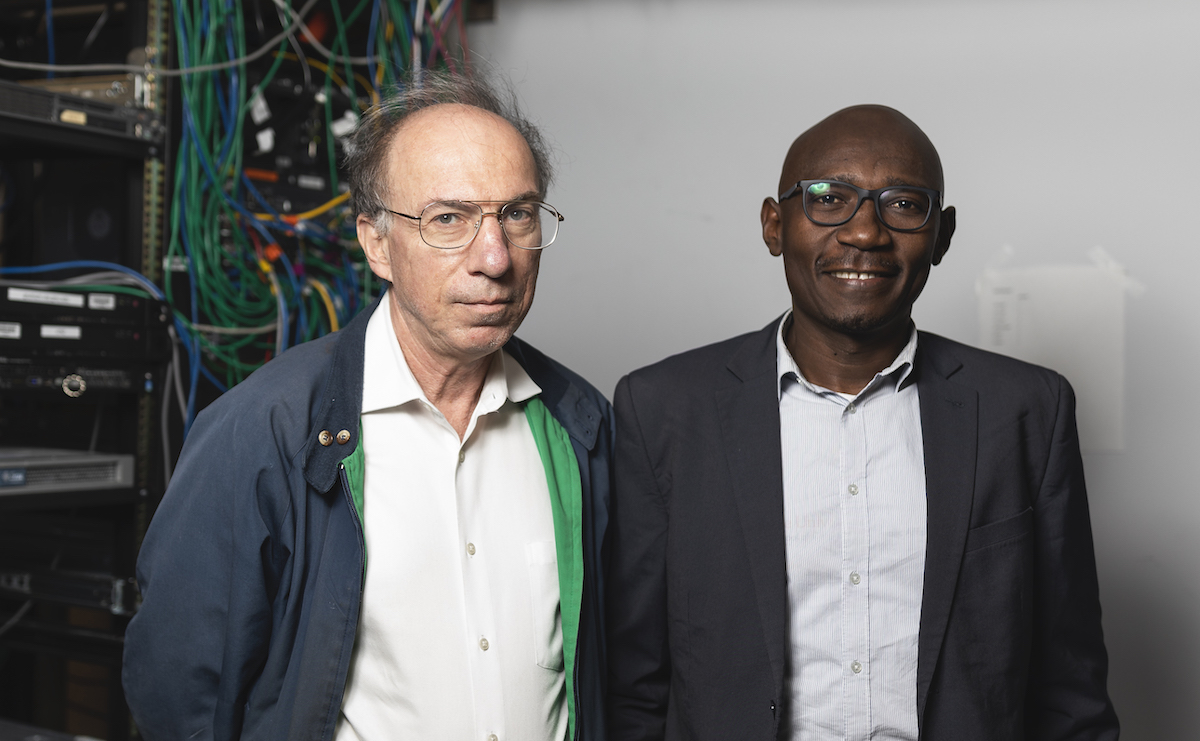In This Story

In 2019, Serge Adouaka, an IT executive from Central African Republic (CAR), paid a six-week visit to George Mason University as part of his Humphrey Fellowship, a Fulbright-affiliated program for scholars and professionals from developing countries. His Mason host was J. P. Auffret, who directs both the Center for Assurance Research and Engineering (CARE) in Mason’s College of Engineering and Computing and the Research Partnerships and Grant Initiative for Mason’s School of Business. This short stint laid the groundwork of a lasting partnership between the two that may help foster economic growth in one of the world’s most challenging contexts.
Adouaka was the seventh Humphrey Fellow to be hosted by Auffret, who believes that information and communication technology (ICT) “for development and entrepreneurship is a good path to enable careers and raise a country's per-capita GDP and standard of living while reducing poverty.”
During Adouaka’s time at Mason, the pair explored how ICT ecosystem development could point the way toward a brighter future for CAR. Adouaka returned home inspired and determined to put these ideas into action.
He worked with Mason and the University of Bangui to launch an accelerator for CAR-based tech founders and start-up managers. The U.S. State Department has provided funding for the project. Participants in the three-month program receive mentoring from the Mason community, as well as from experienced professionals within the CAR and neighboring countries.
The initial cohort of 20 entrants represents a wide range of areas, including agriculture tech, health and geographic systems, computer design, system integration, IT placement, video games and financial technology (fintech). Their primary goal for the three months is to devise a “next-step” plan for achieving scale, with the help of their mentors.
It is also hoped, however, that by forming relationships with other accelerator participants and mentors from CAR and beyond, they will foster a culture of entrepreneurship in the small African country and build strong professional networks that are more than the sum of their parts.
Almost as soon as the program began, there were hints that this was starting to happen. Recently, participants decided to hold some meetings face-to-face at the University of Bangui instead of remotely. The final presentation that officially concludes the program’s first iteration—where participants will unveil their future plans—will also be an in-person event.
CAR’s small population and challenging rural terrain mean that networking across national borders is essential for fueling future business growth. Any viable plan for scale must involve penetrating regional markets outside CAR. Sub-Saharan Africa has an increasing number of regional role models. For example, five-year-old Nigerian fintech unicorn Flutterwave has expanded to 20 African countries and even has an office in San Francisco (so it can tap into the $48 billion remittances business driven by the sub-Saharan Africa diaspora). Microloan app Tala launched in Kenya in 2014 and has since spread to the Philippines, Mexico and India.
To be sure, CAR has unique challenges. It has experienced only intermittent intervals of peace in its 61 years as an independent nation. To this day, the government and people, security forces and U.N. peacekeepers struggle to quell rebel violence and stabilize the country. Amid these volatile conditions, CAR has been left out of the economic growth enjoyed by many other sub-Saharan countries. Rwanda, for example, is on a path to becoming an upper-middle-income country within 15 years despite the turbulence of its recent history. Could CAR, too, join in the “African economic miracle”?
Auffret cites CAR’s increasing mobile phone adoption as a meaningful sign of hope. Mobile technologies enable developing countries to leapfrog the need for heavy physical infrastructure such as telephone wires and bank branches.
Also, Auffret says that underdeveloped countries like CAR may also be able to use their relatively open regulatory environment to gain an advantage in commercial drone technology. Already, companies in Kenya and Nigeria are widely deploying drones for last mile delivery, cartography and other business purposes.
In the meantime, ambitions run high for the Mason accelerator. With the initial three-month program nearly concluded, plans for the second cohort are underway. Eventually, Auffret and Adouaka would like to secure support from private companies, both in Africa and the United States.
Another short-term goal is to recruit major international development agencies as venture partners. Auffret expects these influential parties will share his view that the uncertain security situation in CAR makes this accelerator—and ICT innovation in general—an urgent priority for the country.
“Increasingly the Mason mission is to contribute and have impact globally, and this project is one of many Mason initiatives aligned with the U.N. Strategic Development Goals,” Auffret said. “Through international work, such as this accelerator, one can gain a better sense of the wonder of the world, as well as make a contribution to the well-being of societies.”
